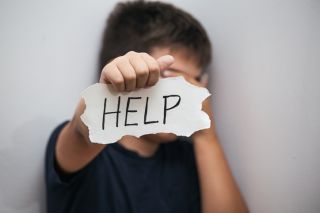Parenting
How to Influence Teens Who Cover Up
What to say to "It's none of your business" and other porcupine tactics.
Posted March 14, 2023 Reviewed by Ekua Hagan
Key points
- Even when teens or other kids seem unreceptive and in denial, parents have a significant impact on their emotions, behavior, and decisions.
- Using the right tools with teens and adult kids with issues, parents can bring out higher functioning and better behavior in the interaction.
- Children internalize parent’s expectations, fears, and anxieties through the emotional connection but parents can shape the impact of this.

Many parents face the challenge of trying to help a teen, young adult, or older adult child who is refusing to face a conspicuous problem. In a common scenario, parents are forced to bear witness to a smoldering problem with apparent solutions, but silenced and forbidden to help—with the child calling the shots.
A typical situation involves kids who use denial, avoidance, wishful thinking, and blaming other people for their disappointments or failures, claiming they have everything under control and don’t need help. For example, it could be a college-age child who got put on probation or had to take a leave from school due to failing grades, a failure-to-launch or dependent adult child, or a teen struggling emotionally and/or academically.
Even when teens or other kids seem unreceptive, parents have a significant impact on their emotions, behavior, and decisions [Knoll et al., 2020, Morris et al., 2017]. With the right tools, mindset, and language, parents can elicit a child's higher functioning self in the interaction [Kaniušonytė & Laursen, 2020].
Problem behavior: Denial and compartmentalization
“I’m fine.”
“I got it.”
“Get off my back.”
Mistake:
You go along with them after numerous failed attempts and escalations.
Reasoning:
“He’s refusing to talk to us and says that we trigger him.”
“What else can we do? He’s over 18.”
“We can’t make him talk and don’t want to micromanage him.”
Here, being at a loss and retreating out of self-protection is rationalized as support for the child’s autonomy. But backing off when children can’t face themselves does not promote higher functioning or independence and, instead, perpetuates inertia and isolation.
Setting expectations and limits is different from micromanaging which is an instinctive reaction to one’s own anxiety and need for control. Alternatively, thoughtful deliberate intervention is a measured response to the situation and conspicuously the harder thing to do.
Improved parenting:
“I understand—you’re saying you’re fine and to back off. [First, summarize what he’s saying so he feels heard and less compelled to repeat it.] But I gotta tell you—you’re coming across as irritable/angry/withdrawn/unhappy [affirming your right to speak, owning your perception vs. telling him how he feels]. We don’t know how you feel inside but that’s the vibe we’re getting [respectful, supports autonomy].”

This approach involves “talking through” to the more vulnerable side of the child to show that you see him, know there is more going on even when he’s hiding, and models speaking about it. Being responsive to the underlying message but not ripping away his defenses helps break through compartmentalization and the effectiveness of disavowing his feelings.
Text the invite: “I need 10 minutes to have a conversation…" [Own what you need vs. telling him what he needs. Start small.]”
Later:
“Maybe I’m wrong [disclaimer] but in my opinion [supports autonomy, creates a healthy boundary] you’re grown up enough to listen/capable of listening with an open mind for 10 minutes without reacting/getting angry/blocking me. So I’m asking you to do that [requesting but in a way that’s hard to refuse].”
Most kids do not want to take the position that they’re not capable or grown up enough to do something. This approach has the advantage of being respectful, forthright, and strength-based, supporting a child’s ability to step up and offering a path.
Problem behavior: Rejection in the service of avoidance
“It’s none of your business.”
“Leave me alone.”
Mistake:
You alternate between backing off, in the wrong ways, and engaging in control struggles—arguing about why it is your business, e.g., you are the parent and he is the child, you are paying the bills.
You avoid explicitly putting into words the angry, unfriendly undercurrent of protest, and react to it instead.
Reasoning:
“He needs to learn respect. We’re not going to let him call the shots.”
“He’s been friendlier in general lately so we don’t want to mess that up by talking about things that upset him."
We are hardwired to be sensitive to rejection so it’s not surprising that when pushed away or blamed, parents can take it personally and feel hurt, guilty, mad, or irrelevant, rather than read between the lines. But backing off in this situation is not sustainable and usually alternates with arguing, shaming, and control battles.
Here, rather than being a positive role model and lending a more regulated state of mind and perspective, parents take a resigned posture, colluding in the avoidance and acting out behavior.
Improved parenting:
“We’re a family and interconnected. Your mood affects the climate here.”
“I don’t know if you’re aware [allows for the possibility that their attitude is unintentional] but you’re coming across as angry/unhappy/unfriendly. It’s loud as if some part of you is making it a point to let us know [re-framing and calling out what he is doing, holding him accountable].”
“We don’t want to trigger you and know you don’t want our involvement. But we need certain things in order to be supportive and invest in the plan that you want [taking responsibility for your own needs vs telling him what’s good for him].”
“We’re all on the same team. Being divided is not a winning strategy. Putting our heads together will help you reach your goal.”
Problem behavior: Blaming and trying to control you to stave off anxiety and shame.
“You’re the cause of my anxiety. If you let me come home from school when I was having a panic attack, I would’ve been fine. I know what I need!”
“It’s because you keep bringing up school/weed when I told you not to talk about it.”
“It’s because you always favored Adam. I hate you!”
Mistake:
You react to the powerful feelings, buy into the blame game, and try to make up for the child’s difficulties, e.g., capitulate to their demands or otherwise indulge and act solicitously.
You become legalistic in how you think about your role in the problem.
Reasoning:
“It’s true we treated him differently than Adam.”
“We should have recognized these issues sooner.”
Here the parent is aware of having made some parenting mistakes and reacts out of guilt.
Improved parenting:
“We see we’re aggravating and upsetting you. You’re right—we’ve made mistakes and don’t always say or do things the best way [validating his experience, taking responsibility]. If getting us to be quiet or make up for things would solve it, we’d consider it. We tried that and failed so that’s not an option [clarifies your viewpoint and intent].”
“In our opinion, right or wrong [humility vs. force], trying to control what we do won’t help you be stronger/independent or navigate this transition [calls out what’s happening in a palatable way].”
To set limits in response to legalistic or other accusations:
“We reserve the right to use our own judgment/rethink things and change our mind [authoritative vs. authoritarian or permissive parenting].”
“We understand you hate us right now [tolerating but tempering the “hate”]. We still have to do what we can live with in good conscience/believe is best.”
This approach models courage, taking responsibility, being decisive but not controlling, and having good boundaries while circumventing argument and debate.
Problem behavior: Self-deception. Accusing you of what you actually believe, but laced with unspoken dire implications.
“You don’t trust me.”
“You think I’m an addict.”
“You think I’m going to fail.”
Mistake:
You argue the counterpoint, cover up, deny the truth, or hedge.
You offer meaningless reassurance or change the subject and defensively point out the positive.
Reasoning:
“We don’t want to make him feel worse about himself or make things worse. What if he leaves home and cuts us off permanently?”

When a parent ignores the elephant in the room, they are sending a message that they believe the child is too fragile to handle the truth, the truth is too shameful, and/or the parents themselves can’t face the truth.
Here, reacting out of fear and insecurity, parents unconsciously operate as co-conspirators, endorsing denial and cover-up, with a confusing message that mirrors the child’s defenses, validates their fears, and reinforces self-deception and shame.
Improved parenting:
“I’m not sure what you mean—what do you need us to trust? [Be curious. Find out what he means before commenting.]
“We believe you’re capable of handling the truth/respect you enough to tell you what we think.”
“We do think you’re addicted to weed. I know you disagree. What bothers you about that?”
“We don’t know what will happen. You might succeed, but you might not [reality check stated matter-of-factly]. We don’t agree that your approach leads to success. What does it mean to you if we don’t have blind faith?”
Children internalize parents’ expectations, fears, and anxieties. [Knoll et al., 2020] Parents can shape the impact of this by talking openly, naming feelings, and translating interactions so they can be metabolized, rather than a source of shame and division between you.
Being able to speak the truth and own what your position is and isn’t, and what you see, in a non-judgmental matter-of-fact way models integrity, courage, and perspective while demonstrating that what’s happening is bearable and that your child is not alone.
Further, taking responsibility for your own feelings validates your child’s experience so they can sort out what’s true, and differentiate your input from their own fears and feelings.
Shame is decreased when parents can regulate their own emotions, resist the impulse to pretend and provide scaffolding children need to develop confidence based on experiences of mastery, rather than false reassurance.
References
Kaniušonytė, G., & Laursen, B. (2020). Parenting styles revisited: A longitudinal person-oriented assessment of perceived parent behavior. Journal of Social and Personal Relationships, 38(1), 210–231. https://doi.org/10.1177/0265407520960818
Knoll, L. J., Gaule, A., Lazari, A., Jacobs, E. A. K., & Blakemore, S. J. (2020). Neural correlates of social influence on risk perception during development. Social Neuroscience, 1–13. https://doi.org/10.1080/17470919.2020.1726450
Silvers, J. A. (2021). Adolescence as a pivotal period for emotion regulation development For consideration at Current Opinion in Psychology. Current Opinion in Psychology. https://doi.org/10.1016/j.copsyc.2021.09.023
Morris, A.S., Criss, M.M., Silk, J.S., & Dr., B.J. (2017). The Impact of Parenting on Emotion Regulation During Childhood and Adolescence. Child Development Perspectives, 11, 233-238.




